- Home
- Scott Turow
Pleading Guilty Page 11
Pleading Guilty Read online
Page 11
'This is important,' I added.
I got a look that could have smelted lead.
'So's what I'm doing, man. We're 10 percent below budget and looking for ways to reallocate every expense we got. Don't you want to make money?’
Boy, this is a lady with an attitude - capital A - one of those powerhouse African-American women whose chief regret seems to be that she has but one life to fume over the indignities of the last few centuries. No one gets along with her. Not the attorneys, the paralegals, the staff. During her years as a secretary Glyndora worked with half the lawyers in the firm. She couldn't cut it with another woman and lasted only a week with Brushy. She'd been far too intimidating for Wash - and many others. In all the ensuing scrapes Glyndora's been protected by - guess who? - Martin Gold, patron saint of the local eccentrics. He seems to find her amusing and, as I knew well, is inclined to forgive every sin except sloth for the sake of ability. Able Glyndora is. That's the problem. She resents the way she's been enslaved by circumstance. She had a kid at fifteen, whom she raised on her own, with no chance after that really to make her way.
Recognizing that Glyndora could not resist the chance to prove how capable she is, Martin had ultimately teamed her with Bert, the lawyer for whom she'd worked longest. Glyndora filed his motions, kept his schedule, wrote the routine correspondence, filled in the blanks on the standard interrogatories, made excuses when he took a powder, even went to court for him in a couple of emergencies. (And had an income about 10 percent of his, if you'll excuse the son of a union man.) The only problem was that about a year ago they began to fight. Here I am not being euphemistic. I do not mean occasional cross looks or even one or two sharp words. I mean standing in the hallway bellowing. I mean papers flying, clients in the doorways of the conference rooms staring down the halls. I mean Scenes. Finally, someone who must have been in the army or on a police force got the right idea: promote her. Glyndora was less a tyrant as a boss than she had been as an employee and she clearly enjoyed having a universe of her own. Bert, naturally, carried on like a baby when they took her away. And Glyndora undoubtedly enjoyed that too.
'Glyndora, it's this Litiplex thing. The money.' That stopped her. We were in front of a row of bone-colored cabinets. Her face was narrowed by her customary suspicion. 'When you searched for the paperwork, I think you could have missed a memo. From Bert. Maybe attaching some kind of agreement with Peter Neucriss?'
She shook her head immediately, a copse of long hair, dulled by straighteners. I nodded firmly in response.
'Hey, man.' She swept her hand wide. 'I got 80,000 files here and I had my nose in each one. You think you can do a better job, Mack, help yourself. We lock up at five.'
The phone rang then and she picked it up, long sinister sculpted nails painted bright red. Glyndora is past forty and showing little wear. This is one good-looking woman and she knows it - built like the brick shithouse you've always heard about, five foot ten in her stocking feet and female every inch of it, a phenomenal set of headlights, a big black fanny, and a proud imperial face, with a majestic look and an aquiline schnozzola that reports on Semitic adventures in West Africa centuries ago. Like every fine-looking human I have ever met, she can be charming when there's something she wants, and with me, in certain moods, she's even something of a tease, picking up, I guess, on a certain susceptibility. I've lived most of my life with women like this, who were suffering from the peculiarly female frustration of feeling there had never been any way out to start - and besides, a body can't ignore how she looks. I've heard men speak of Glyndora with admiration for years - but only from a distance. As Al Lagodis, an old pal from the Force, told me one day when he came by for lunch, you'd need a dick like a crowbar.
She had no use for me now. 'I told you, Mack,' she said when she was done on the phone, 'I don't have time for this.'
'I'll see you at five. You can show me what you went through.'
She laughed. Glyndora and non-essential overtime were mutually exclusive. 'When?' I asked.
She picked up her purse, dropping something into it, 118
and gave me a little tight smile that said, Go jump. She was on her way down the hall, where I couldn't follow. I said her name to no avail. She left me by her desk. The newspaper from which she'd ripped that item was still open. It looked like it had been an article, an eighth of a page. A little portion of the headline remained. WES, maybe part of a ‘I. West? I looked up. Sharon, one of Glyndora's underlings, was watching me, a little brown woman in a pink outfit that was half a size too tight. Twenty feet away, she eyed me from her desk with suspicion - worker against boss, woman versus man, all of the workplace's silent little competitions. Whatever I was looking for, she figured, I shouldn't know.
I tried a silly smile and stepped away from the forbidden zone of what was Glyndora's.
'Tell her to call me,' I said.
Sharon just looked. We both knew I had no chance.
B. Prince of Darkness
TransNational Air Flight 397 went down in a horrible fireball at the Kindle County Municipal Airfield in July 1985. A TV crew was coincidentally at the airport to cover the arrival of the Peking Circus at a nearby gate and so the footage played again and again across the country, you've probably seen it, 397 bouncing on its front wheel and taking air again, looking a bit like a kiddie's book where the hippopotamuses dance ballet, all quite slo-mo and graceful until the thing canted forward, hit square on its nose, and fire ignited, flashing through the cockpit first and then rolling back through the plane, lighting the windows as it went, until the engines and underbelly blew off in a memorable eruption of orange and yellow flame. No survivors - 247 fried.
At this point, the plaintiffs' lawyers took the field, the guys and gals who prate to juries about the misery of the widows and orphans and then take a full third of what is forked over in sympathy. As someone who works the other side of the street, I'll spare the high and mighty - let me just note that Peter Neucriss, Barracuda-in-Chief of the local plaintiffs' bar, had filed three lawsuits in behalf of the families of crash victims not only before the remains were buried but in one instance before, quite literally, they had cooled. Within six months, there were more than 137 cases on file, including four class actions in which some enterprising lawyer claimed to represent everyone. All of these cases were consolidated before Judge Ethan Bromwich of the Kindle County Superior Court, a former law professor at Easton whose brilliance is exceeded only by his regard for his own abilities. And in every single suit, TransNational Air, our client, was the lead defendant.
Being the airline in an air crash case is sort of like driving a bumper car at the carnival. There are more drivers than you can count; no one knows or cares about rules of the road; everyone's headed in his or her own direction; and every single one of them seems to get his jollies out of ramming you in the behind. It's not just that there are 247 individual victims, each one with relatives and lawyers looking for money to assuage their misery, but you also have ten or twelve co-defendants, ruthlessly pissed off to be involved. Everybody gets sued, not just the airline and the pilot's estate, but any poor son of a bitch who left so much as a fingerprint on the plane: the folks who made the body, the engine manufacturers, the flight controllers, even the company that distilled the gas - anybody with deep pockets who might conceivably be blamed or forced by the prospect of a decade of expensive litigation to throw a few million bucks in the pot. And every one of those folks has a stop-loss insurer who steps to the plate looking for a way to deny coverage to the company that pays their premiums, or, if that won't work, to blame somebody else and get them to pay. There are weathervanes that do not point in as many directions. We blame the people in the flight tower; they in turn say the ailerons weren't working; the manufacturer speaks of pilot error. The plaintiffs all stand on the side and gloat.
About a year after 397 went down, Martin Gold began an effort that seemed to me as romantic and ill-considered as the Crusades: settling 397. Martin has a mi
nd like a cloud chamber, that device where nuclear physicists trace the course of complex atomic reactions; he is probably the only lawyer I know who could even have embarked, let alone succeeded, on a negotiating process which, at one point, had him taking calls from 163 different attorneys.
Under what Martin is always careful to refer to, even sometimes in the office, as 'The Bromwich Plan' the defendants, meaning for the most part their insurance companies, put together a fund of $288.3 million. In return the plaintiffs, led by Neucriss, agreed that the damages in all the cases together could not exceed that sum. Over the last five years, every individual case has been either tried before a Special Master, or more often settled, with Captain Bert heading the TN litigation team and supervising administration of the settlement fund which G & G has held in an interest-bearing escrow.
Recently, as the last of the damage trials have been resolved, we've had an unforeseen development: there's going to be millions left over which, accordingly, will remain the property of little ol’ TransNational Air. Indeed, the only problem for TN has been keeping this news to ourselves, since it would be a public-relations nightmare to explain how, when everything is added and subtracted legal fees, interest, the surplus, and TN's initial contribution to the fund - the company netted close to $20 million by killing 247 people. More pertinently, the plaintiffs' lawyers, who have never seen a dollar they didn't think was rightfully theirs, would use that vulnerability to weasel themselves a bigger share, and the co-defendants of course would wail piteously. We have been on a self-conscious campaign to make sure that every plaintiff has been paid out and signed a release before we submit our final accounting on the settlement fund to Judge Bromwich. Nonetheless, if you put liquor into Tad Krzysinski, TN's CEO, in an intimate setting, you can get him to laugh pretty hard at the inevitable jokes about crashing more planes.
When I was finally allowed to see Neucriss about 4:30, he had a tuna steak on a plate before him. Just out of court, he was enjoying a light supper, preparing for an evening's toil. He had a full kitchen and a chef in the office. The immediate air was savored with ginger, but there was still the frantic feel of trial. Peter's $100 foulard was dragged down; the sleeves were rolled on his white-on-white silk shirt; he stood as he ate, rumbling out every free-associated thought as a command. Four or five associates came charging in and out with questions about exhibits that they would need tomorrow. It was a bad-baby case, worth in Peter's hands at least $10 million. The mother was going on in the morning.
Meanwhile, I sat there in the mendicant pose in which Peter prefers to see everyone around him. I was hoping to get a quick answer and go. I had brought over drafts of the payout documents on 397, and had casually mentioned Litiplex, using the routine Wash said had been employed with others - correspondence we couldn't place, maybe Peter had an idea?
'Litiplex.' Peter touched his forehead. He stared, unsee-
ing, toward the middle distance. 'I did talk to somebody about that.'
'You did? Was it Bert?'
'Bert?
'He's been out of town, I haven't been able to ask him.'
'Right. Visiting his family on Mars.' Neucriss rolled his eyes. 'No. Who?' He drummed his fingers, he yelled for one of the secretaries, then stopped her with an explosive clap of his hands. 'I know who asked me about Litiplex. Jesus Christ, what a squirrelly bunch you are. Don't you guys even talk to each other? Gold. Gold brought it up. Is he out of town too, or just out to lunch?'
My heart went flat, I wasn't even sure why, except I knew something was wrong. There were plaintiffs' guys Martin could talk to with confidence, whereas even hello on the street with Peter required full body armor for Martin and an Alka-Seltzer afterwards.
'Martin?' I asked.
'No, good as. Yeah, Gold called three or four weeks ago. Doing the same soft-shoe as you, talking to me about something else, then trying to slide this Litiplex name in so I wouldn't notice. What the hell are you guys up to now?'
Nothing, I said. Lying to Peter is not even a venial sin: speaking to a Frenchman in French. Wash had said Martin phoned a couple of plaintiffs' lawyers with discreet inquiries about Litiplex, but it had never crossed my mind they might include Neucriss. In the meantime, I tried to smooth over the concerns all this Q and A about Litiplex seemed to have raised. Just getting ready for distribution, trying to cover all details, who more likely to know all than Peter?
With Neucriss, flattery is always the best way. Perhaps because it is the social world's realm of ultimate restraint, the law seems to attract more of these types, the utterly self-impressed who regard the bar as the pathway to a frontier where will and ego can go virtually unbounded. The sole partner in a seventeen lawyer firm, Neucriss is the only lawyer I know who earns more every year than a good left-handed pitcher makes in the National League. Between $4 and $6 million are the printed estimates, and this year, with some $30 million worth of settlements in the 397 litigation about to pay out, his income will, as he puts it in his own unctuous way, 'reach the eight figures'.
This success has not been achieved by adherence to scruple. Peter's political contributions are vast - he hits every limit and gives in the name of his sixteen associates, his wife, and his children. Even so, he leaves nothing to chance. His witnesses are skillfully tutored; documents disappear; and in the bad old days, perhaps not entirely gone, when cash on the barrelhead bought judicial favor, Neucriss was figured to do this as well. Worst of all, his very prominence is a sort of revolting advertisement of the fallibility of the jury system. Ten minutes with this guy and you know the story: ego run wild, some form of character disorder. But somehow, from juries, Peter's schmaltzy performance, his self-congratulatory baritone and silvery mane, have drawn nothing but rave reviews for forty years. He goes on, with all of us knowing that no matter what his triumphs, his wealth, the national accolades, all the purchased adoration, the only motive force in nature surer than gravity is Peter's desire for more.
He continued talking about Martin, always a raw nerve with him.
'Oh yeah. What was Gold's line? Something like yours. A letter to be forwarded. I asked him, "What game is this? Post Office? I thought that was adolescent foreplay."' Neucriss roared at himself, his mouth still full. Being profane, he kept Martin on edge.
'But what about it, Peter? Litiplex? What is it?'
'Listen to this. How the hell do I know? For crying out loud. Call information. Ask them about Litiplex. Jesus Christ,' he went on, 'how do you stand stuff like this, Malloy? One hundred forty lawyers running around bumping into each other. Two senior partners sorting the mail. And now you'll bill Jake Eiger five hundred bucks for looking at an envelope and tell him it's the plaintiffs' lawyers who make legal expenses so high.'
Jake and Neucriss were sort of on speaking terms, since Jake's dad was one of those pols to whom Neucriss had barnacled himself decades ago. Peter, in the meantime, was off and running, going on about big law firms, the Gog and Magog of his universe. In his own oleaginous way, he was even attempting to appeal for my support. He knew where I stood at G & G - the entire legal world, local and national, was mapped in his head. Hanging on there by my fingernails, I might be brought to side with him against my partners. Instead, I fended him off lamely with wit.
'If I didn't know better, Peter, I'd think you were offering me a job.' As soon as I said it, I heard that the tone was all wrong. Neucriss's quick eyes registered something, the possibility of corruption, which around here is always in the air, like carbon dioxide. He held on just a second before rejecting that thought.
'Not you, Malloy. You're an old plowhorse.' That's all he said. Dead or dying went unspecified, but either way, my bones in his view would soon be tromped upon, ground down by some other dray treading my row. He went back to work and I went on my way, fighting him off, trying not to be diminished by his estimate, but of course feeling absolutely flattened. I wasn't even worth buying off.
I was on the street, my overcoat open for the short walk to the Needle,
buffeted by the thick pedestrian traffic on all sides, workers departing in the sullen dwindling light of winter. Overhead, the sky was dimming to the color of a burnt pot. The morning snow was now nothing but a dampness on the walks, freezing over amid the little hummocks of salt that rimed the concrete and would stain my shoes.
In the interval, I tried to figure what was doing. I wouldn't say I believed Peter. It was safer to bet on the Easter Bunny. But I couldn't figure why he had anything to hide. I was feeling surly, in a formerly familiar cop-mood in which everyone was a suspect. Bert. Maybe Glyndora. Even, possibly, God's emissary on earth, Martin Gold. The vague unpredictability of Martin's behavior bothered me especially: the way he'd been with Jake; the fact that Martin had called Neucriss, which he ordinarily did only when somebody was paying premium rates. I stopped on a corner where a little boy in a hooded sweatshirt was hawking papers, while a sudden wind snapped my muffler in my face. Here I stood in the city where I've lived my entire misbegotten life, the canyons I've been prowling for decades, feeling depressed and undermined, full of the convincing if momentary illusion that I didn't know where in the hell I was.
C. Somebody Else's Girl
For unexplained reasons, I always found it a shock seeing Brushy's pale meaty thighs in her athletic shorts. Her adolescent acne still flared on the parts of her body that were ordinarily concealed, high up on her arms and in the V-neck of her tennis shirt, but I found her appealingly girlish. She did not spend much time letting me look her over, though, and began to bat the ball around the racquet-ball court. We went through more or less the same routine each week. I moved well left and right, and had superior reach and better strokes. Brushy swung with an awkward roundhouse, elbow locked, but she scrambled all over the white-walled court like a squirrel and got to every shot; she'd run me over rather than call hinders. Each week we'd play the first two games even. I careered around, yelling oaths and curse words whenever I mishit the ball. Then Brushy, who had not hit drop shots out of deference to my knee, would dink one ball after another, until I was limping and so short of breath I could faint.

 Testimony
Testimony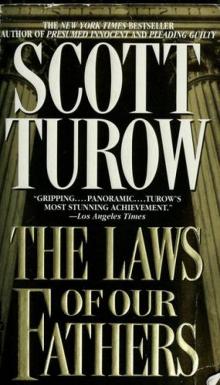 The Laws of Our Fathers
The Laws of Our Fathers Ordinary Heroes
Ordinary Heroes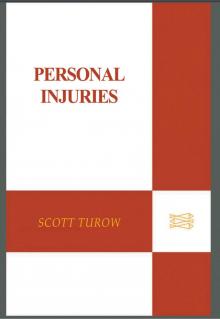 Personal Injuries
Personal Injuries Limitations
Limitations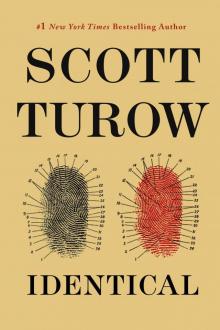 Identical
Identical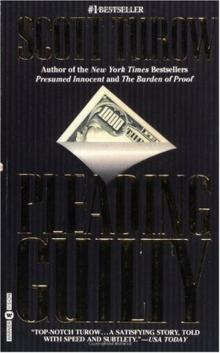 Pleading Guilty
Pleading Guilty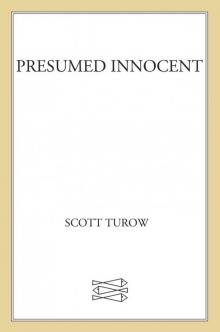 Presumed Innocent
Presumed Innocent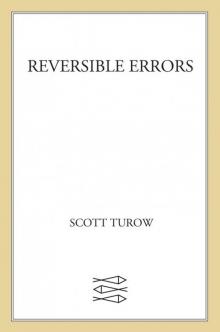 Reversible Errors
Reversible Errors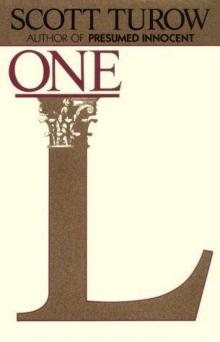 One L: The Turbulent True Story of a First Year at Harvard Law School
One L: The Turbulent True Story of a First Year at Harvard Law School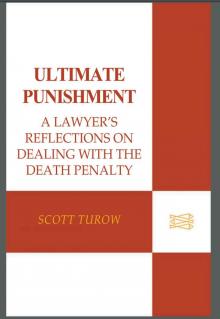 Ultimate Punishment
Ultimate Punishment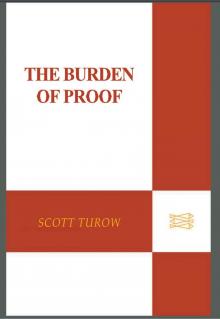 The Burden of Proof
The Burden of Proof Ordinary Heroes (2005)
Ordinary Heroes (2005)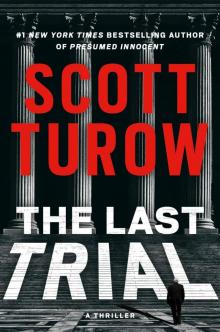 The Last Trial
The Last Trial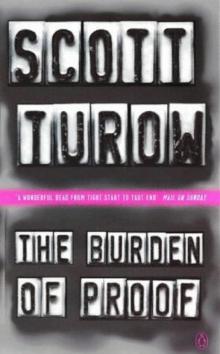 The Burden of Proof kc-2
The Burden of Proof kc-2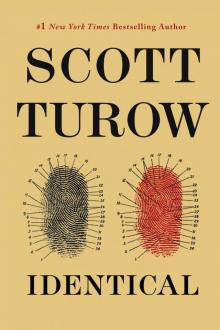 KC09 - Identical
KC09 - Identical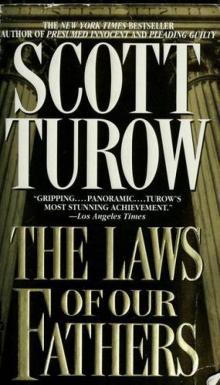 The Laws of our Fathers kc-4
The Laws of our Fathers kc-4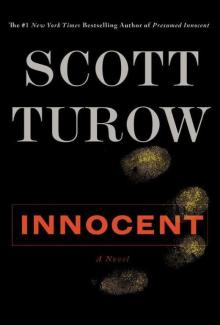 Innocent kc-8
Innocent kc-8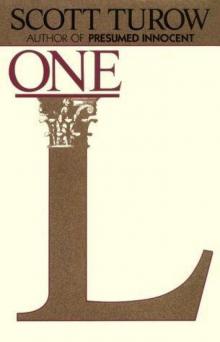 One L
One L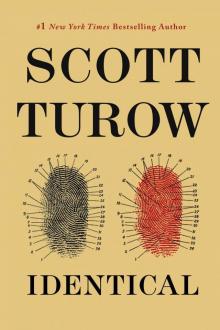 Identical kc-9
Identical kc-9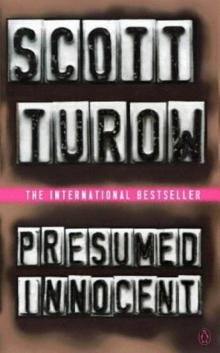 Presumed innocent kc-1
Presumed innocent kc-1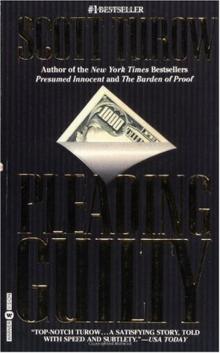 Pleading Guilty kc-3
Pleading Guilty kc-3 One L (1977)
One L (1977)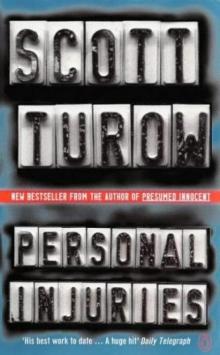 Personal injuries kc-5
Personal injuries kc-5